Supanan Sucharit1,*, O-Phart Phrathep1, Thanyanan Somnam2
1Department of Biology and Health Science, Mahidol Wittayanusorn School, Thailand
2Department of Physics, Mahidol Wittayanusorn School, Thailand
*Email:
The 20th International Students Science Fair 2025 (ISSF 2025), hosted by Mahidol Wittayanusorn School in Thailand, offers a remarkable opportunity to showcase student talent in STEM and empower the educators who nurture it. Recognizing teachers as the cornerstone of this endeavor, ISSF 2025 is committed to fostering a collaborative and inclusive environment where educators can thrive. By strategically designing activities tailored for teachers, we will ensure that the International Science Schools Network (ISSN)’s core values – respect, collaboration, support, inclusion, and a strong sense of community – are fully realized. This, in turn, will significantly contribute to the ISSN’s overarching goals of sustainability, visibility, and capacity building.
Teacher Sharing Session at ISSF 2025: Sharing and Learning for Educational Development
In an era where digital technology and artificial intelligence (AI) play a crucial role in all aspects of society, the education system is undergoing a significant transformation. This includes changes in teaching methods, the development of more interactive learning materials, and the use of AI to analyze student data for optimizing teaching approaches. AI also promotes personalized learning, allowing students to experience education tailored to their strengths and interests. Consequently, the education system must adapt to accommodate these changes.
However, digital technology is not the sole factor influencing the education system. Environmental issues and sustainable development are critical topics that must be integrated into the learning experiences of 21st century youth. The increasing severity of environmental problems, such as climate change and biodiversity loss, compels the education system to adapt and provide systematic solutions. Integrating knowledge in science, technology, engineering, and mathematics (STEM) alongside sustainability concepts will equip students to confront future challenges.
ISSF 2025 is a crucial platform for students to showcase their academic potential and establish learning networks. The Teacher Sharing Session, a core component of the event, aims to enhance the capabilities of teachers and educational personnel. It provides opportunities for sharing knowledge and establishing academic networks to foster sustainable learning. The focus is on utilizing AI and digital technology in education, promoting environmental awareness, and incorporating sustainable development practices to ensure that 21st century education effectively addresses contemporary global challenges.
To achieve these goals, the Teacher Sharing Session is designed as a platform for exchanging knowledge that encompasses academic aspects, technology, and the development of teachers’ social skills. The emphasis is on creating knowledge and practical approaches applicable to diverse national contexts. The session comprises three main sections:
I. Inspiring Minds: Expert Insights and Experience Sharing
This activity focuses on providing insights into emerging trends in education, particularly concerning the use of digital technology and AI to enhance learning and student assessment. Expert insights will shed light on the role of these technologies in creating more effective learning experiences. Meanwhile, experience sharing from teachers and educational professionals will facilitate the exchange of teaching methods and best practices from diverse global contexts.
Associate Professor Dr. Phongpraphan Pongsophon from the Faculty of Education at Kasetsart University highlighted the significance of equipping the younger generation with appropriate tools and ideas to safeguard the environment amidst a worsening biodiversity crisis. He presented a novel approach to teaching plant conservation that integrates AI and computational thinking through hands-on activities.
Assistant Professor Dr. Thanapong Intharah from the Faculty of Science at Khon Kaen University shared his experience as a statistics expert, exploring innovations in using AI to enhance educational assessment and personalized learning. Based on recent research in Thailand, this work focuses on two main approaches: The first is an assessment system using machine learning to develop mathematics diagnostic tools with automated feedback and intelligent tutoring modules. This system analyzes students’ mathematics performance, leading to personalized learning pathways. The second approach involves new techniques using generative AI and large language models (LLMs) to create comprehensive assessments across multiple subjects, including Thai language communication skills, critical thinking skills through English literature, Thai reading comprehension, mathematical problem solving, and understanding scientific concepts. The key advantage of this approach lies in using intelligent prompting to create and select the most suitable assessment items.
These expert keynote speeches opened up new perspectives for attendees on the application of AI in teaching and assessment, which is a significant trend in 21st century education.
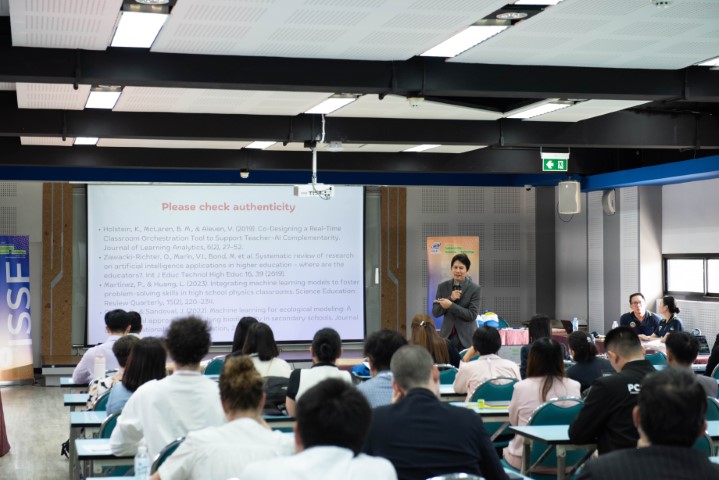
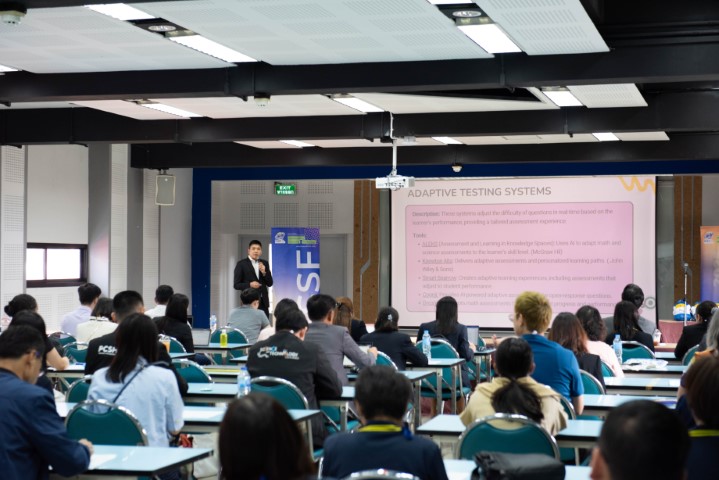
Figure 1. Keynote speeches on the use of digital technology and AI to enhance learning and student assessment were given by Associate Professor Dr. Phongpraphan Pongsophon (left) and Assistant Professor Dr. Thanapong Intharah (right).
Additionally, there was a sharing of experiences from teachers and educational personnel from various countries, covering four key topics:
Ms. Sandy Scott from West Aurora High School, United States: She shared her experience of using the Instructional Coaches and Interventionists system at West Aurora High School to enhance teaching and improve student achievement. Instructional Coaches serve as teaching consultants, collaborating with classroom teachers to guide lesson planning, teaching strategies, and classroom management. They also analyze student achievement data to identify areas for improvement in the quality of teaching. At the same time, Interventionists provide specialized support to students who require additional assistance in mathematics, reading, and science. They can work with the entire class, smaller groups, or individually, enabling teachers to better focus on classroom-level instruction. This system fosters personalized learning and enhances classroom flexibility, allowing students to engage in deeper learning and access the resources necessary for academic success. The collaborative approach between teachers and these specialists empowers schools to deliver high-quality and differentiated learning experiences that effectively meet students’ needs.
Mr. Tun Apiwattanakorn from The Australian Science and Mathematics School (ASMS), Australia: He described the application of Desmos and GeoGebra, free mathematics software, to elevate mathematics learning and teaching in classrooms. He emphasized an approach that blends traditional teaching methods with digital tools, making learning more creative and applicable in real-world scenarios. Using Desmos to create graphical representations allows students to visualize the relationships between variables. It also demonstrates the flexibility of assessment, which can be designed to encourage critical thinking and creativity among students. He showcased student work developed using these tools. Integrating technology into mathematics learning effectively enhances student understanding. However, it is crucial not to abandon the use of paper and pen for calculations and problem analysis. Therefore, ASMS adopts a balanced approach between technology and traditional learning to maximize the benefits of mathematics learning for students.
Ms. Kanokrat Singnuia from Princess Chulabhorn Science High School Nakhon Si Thammarat, Thailand: In terms of encouraging student participation in scientific processes and understanding the role of nuclear physics in sustainable development, she spoke about the “Nuclear Physics for Youths to Sustainable Development (NPYSD)” project. This citizen science project provides students with fundamental knowledge of nuclear physics. Learning includes field trips, allowing students to experience firsthand the applications of nuclear physics. It also allows students to share their knowledge with peers through exhibitions at Open House events, educating them about radiation in everyday life, radiation safety, and radiation protection measures. Project outcomes indicate that students effectively communicated the knowledge they gained to fellow students and visitors, fostering accurate understanding of nuclear physics and its applications for sustainable development. The project also cultivates interest in science and raises awareness of the role of nuclear energy in contemporary society.
Dr. Thanyanan Somnam from Mahidol Wittayanusorn School (MWIT), Thailand: She explained how to develop astronomical data analysis skills to prepare representative students from the MWIT Astronomy Olympiad Center for participating in the 21st Thailand Astronomy Olympiad. This process utilizes a team-based learning (TBL) approach combined with a one-group pretest-posttest design to enhance students’ readiness for the competition. Through TBL, students engaged in collaborative learning, sharing correct methods and alternative approaches to data analysis while reflecting on and learning from their mistakes. A nonparametric statistical method, the related-samples Wilcoxon signed-rank test, was used to analyze pretest and posttest data, revealing a statistically significant improvement at the 0.05 significance level. In summary, this approach proves effective in enhancing students’ data analysis and logical thinking skills, which can be adapted for use in other astronomy Olympiad centers across Thailand.
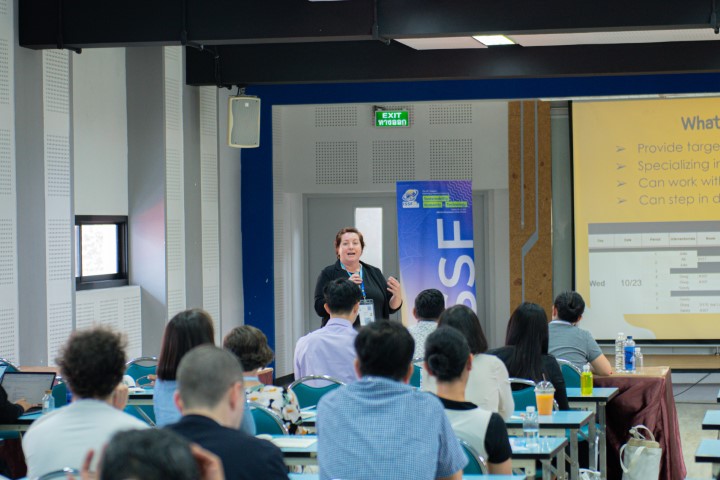
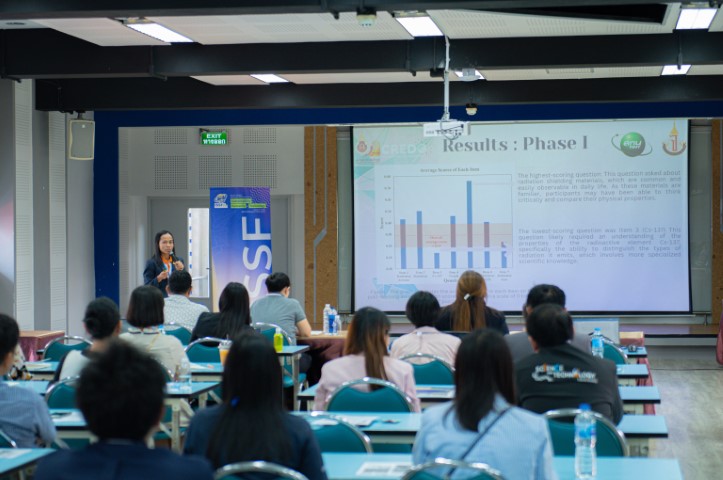
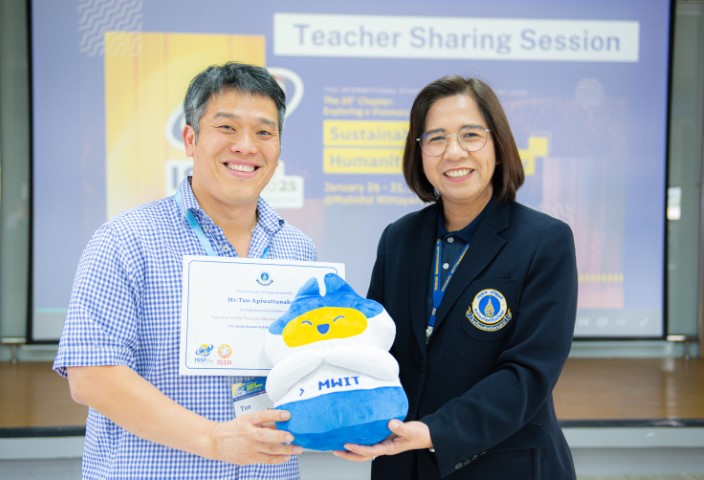
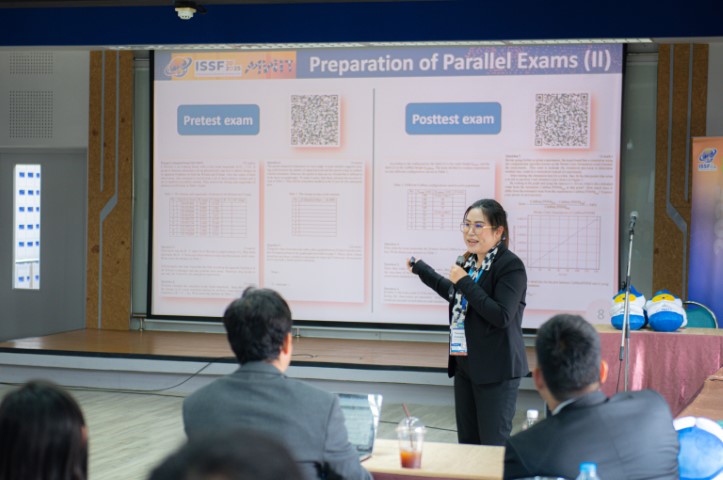
Figure 2. Sharing of experiences from educators from various countries
II. Building Bridges: Relationship Strengthening and Network Building Activities
The Teacher Networking event at ISSF 2025 aims to foster connections among participating educators, enabling them to get to know each other, exchange knowledge about schools within the ISSN, and create opportunities for future collaborative projects. This session occurred between the Teacher Sharing Session and the AI Workshop, featuring four interactive activity stations:
Station 1: Spot-it – A board game that can be completed in just 5 minutes.
Station 2: Pin-it – Participants randomly draw a name card, find the card’s owner, engage in conversation, write down the person’s characteristics and name, and pin it on the world map at their home country’s location.
Station 3: Tie-it – Participants connect threads between pins representing different countries, linking those where they have friends—both prior acquaintances and new connections made at ISSF 2025.
Station 4: Take-it – Participants write a challenge with their name and pin it on a board. Others can choose a challenge, find the challenge owner, and confirm that they accept the challenge.
In summary, this activity involves teachers getting to know each other through games, providing an opportunity to discover teachers’ names, schools, countries, teaching subjects, and favorite activities. The atmosphere was lively and fun.
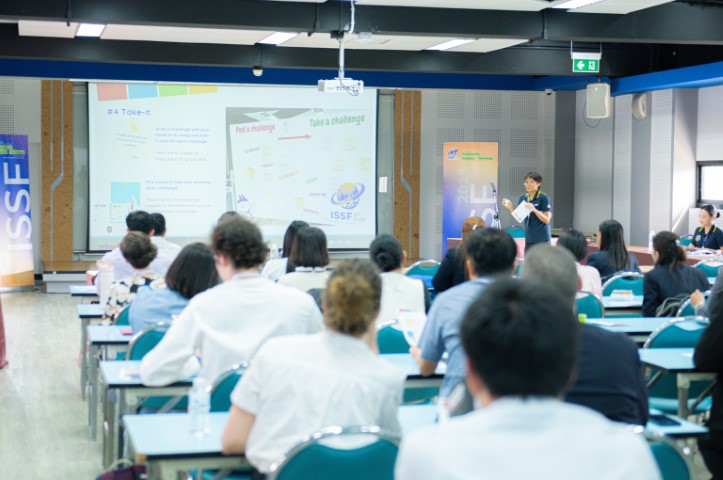
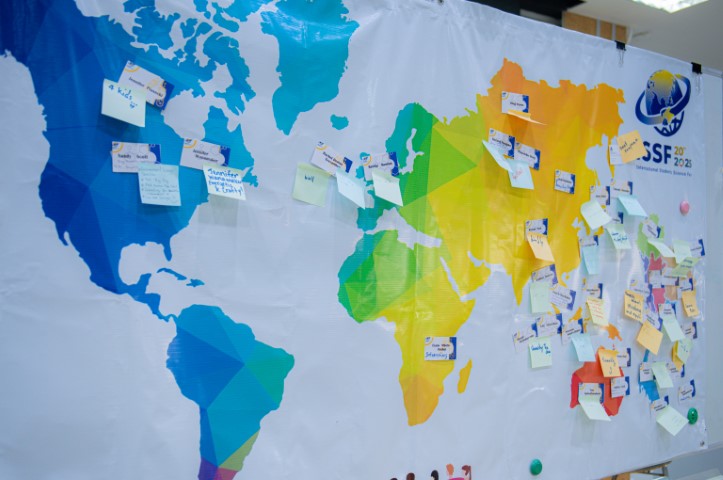
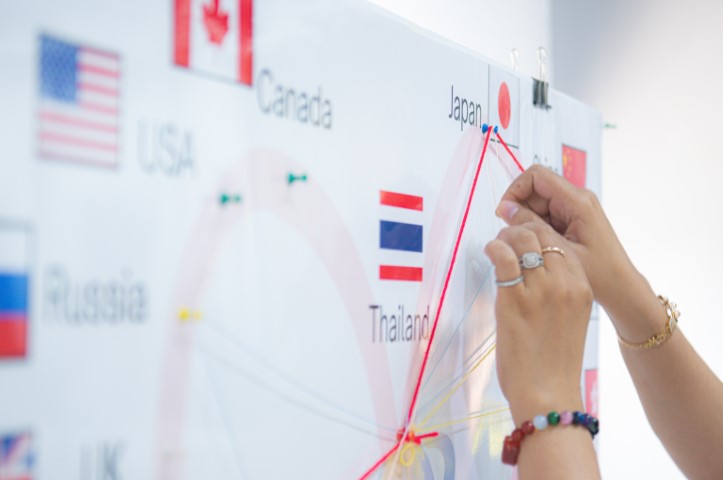
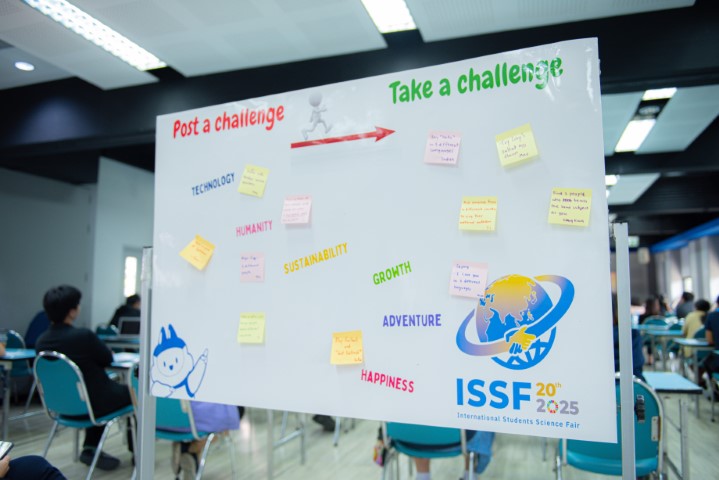
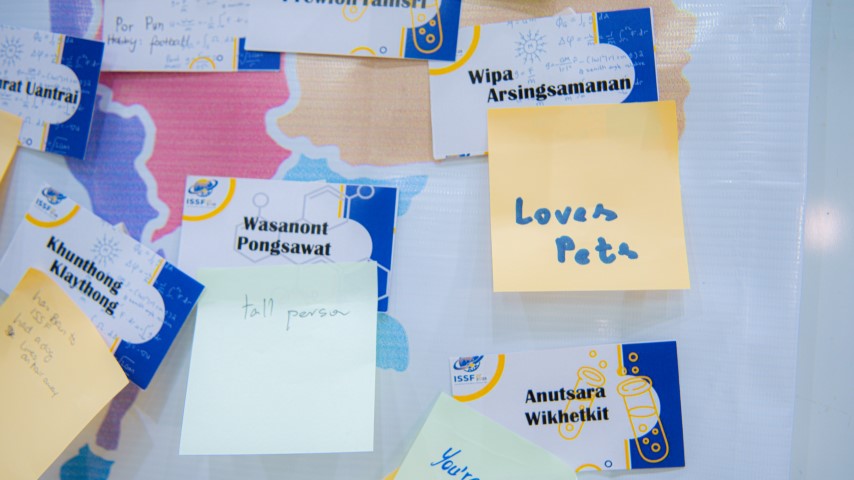
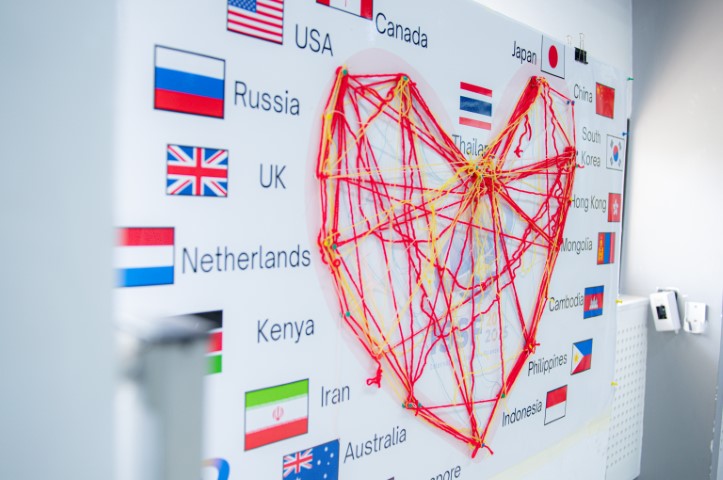
Figure 3. Teacher Networking event at ISSF 2025
III. Innovate & Apply: Workshops
Student assessment is a critical component of the learning process, reflecting teaching effectiveness and informing adjustments to learning methods to suit students’ abilities. However, traditional assessment methods may not effectively address the diverse abilities and learning styles of students. Therefore, generative AI and LLMs have emerged as potential tools for developing customizable assessments tailored to individual student capabilities. These technologies facilitate the creation of flexible assessment items, adapting to student contexts and providing insightful and accurate information about students’ academic progress. Utilizing AI in the assessment process offers a pathway to elevate education, aligning it with the demands of the 21st century.
This workshop offered participants an opportunity to learn about the process of designing and developing multidimensional assessments using generative AI and LLMs. The approach is based on successful research in Thailand’s education system. Participants received guidance on creating assessments that encompass multiple dimensions of critical thinking. The training also taught how to use AI to generate assessments that can be customized to student levels, ensuring more effective, accurate, and student-aligned assessments. Participants experimented with designing assessment items and analyzing data obtained from AI models, receiving guidance from Assistant Professor Dr. Thanapong Intharah to effectively apply these techniques within their educational contexts.
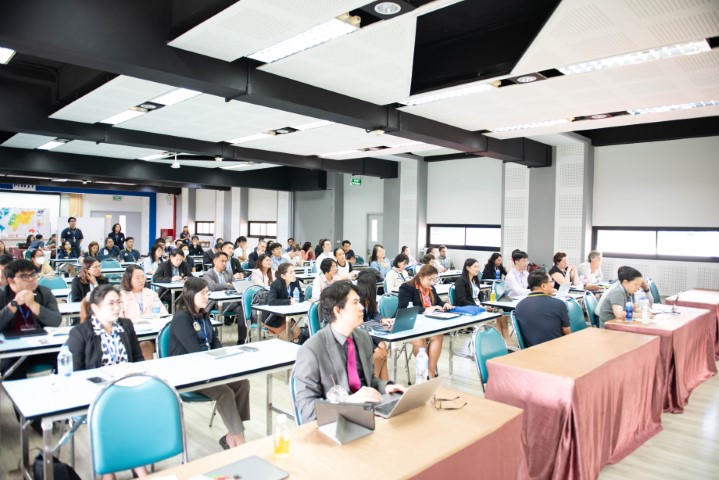
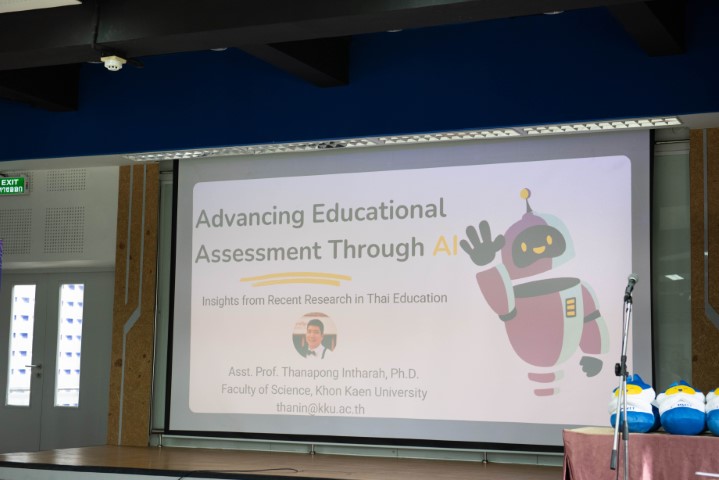
Figure 4. Workshop on advancing educational assessment through AI
Summarizing the Event : Towards a New Era of Learning
The Teacher Sharing Session garnered significant interest from teachers and educational professionals from multiple countries. It featured diverse exchanges of knowledge aligned with the event’s objectives. The experts serving as presenters commended Mahidol Wittayanusorn School, the host, for its exceptional organization and emphasized the pivotal role of AI technology in educational advancement. The sharing of practices from different national contexts inspired attendees to adapt these ideas to their own schools. This represents a critical step in enhancing the quality of education to align with the digital age.


